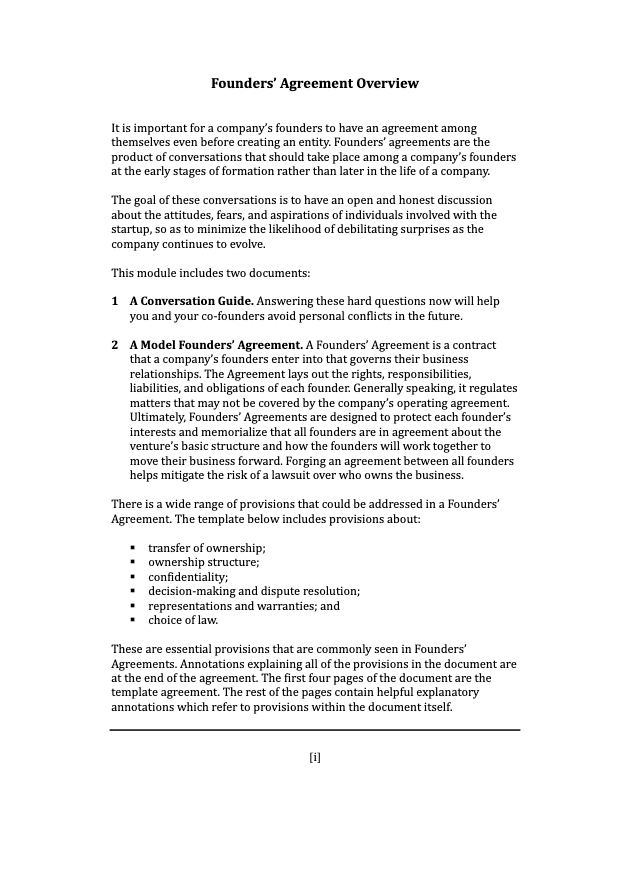Launching a startup can be very challenging and it is easy to forget to write a founders’ agreement. Moreover, when you consider that all partners in the startup have common goals and you are probably friends to start with, it is tempting to ignore the necessity for an agreement.
You obviously trust each other and that is why you are starting a business together, so it does not matter whether you have a startup founder's agreement or not. Well, do not get confused and mix friendship with business. You need a founders’ agreement template to define your business relationship.
What Is a Founders Agreement?
A founders agreement is a legally binding contract that founders of a startup enter into to define their business relationship. The contract covers all the details of the investment of each founder. These include the details of partners involved and the specific capital that has been contributed by each of them.
It also states what happens if one of the founders leaves. Ideally, such an agreement should be developed at the early stage of the lifecycle of the business. This is to make everything clear and bring all partners on the same page before the co-founders put resources together to commence the business.
Of course, startups are often started by friends who trust each other and have a common goal. However, it gets to a point when the business becomes successful and partners start having divergent opinions and personal visions. In this case, only a co-founder agreement can put everything in proper perspective.
This means that you cannot afford to overlook the importance of this contract if you are planning to start a business with someone. Thankfully, you can use the startup founders' agreement template to create your contract. You just have to edit and customize the document.
Why Do You Need a Founder Agreement?
A founder agreement is needed to guide against potential issues that may arise among founders of a startup. It may seem fine to verbally agree on the partnership at the launch of the startup. However, you must understand that people change and their interests also change.
At the beginning of the business, founders generally think about the common goal and are passionate about the business. When the business starts growing and it becomes successful, there is a high chance that personal interests will begin to surface.
At this point, only the founder agreement can maintain the structure and focus on the business. A founder’s agreement clearly outlines the interests of each founder, including their contribution towards the business, the structure of the business, and their roles and responsibilities.
It also covers steps in dissolving the business and what happens if any of the founders decide to quit. This contract protects the interests of each founder in the business and also ensures that the remains an on-going concern. Drafting an agreement requires some technical and legal knowledge.
However, you can use a founder agreement template to write your agreement. You can edit and customize the document to suit your business needs.
Dos and Don’ts Checklist for a Founders Agreement
A founder agreement establishes the framework for a new venture. It also outlines the working relationship among the founders.
This agreement varies from one company to others but it generally covers components such as project description; roles and responsibilities of the individual founders; contribution of the founders; equity ownership, vesting, and rights, legal protections, and decision-making processes.
It is important to know the dos and don’ts checklist when drafting the agreement. You can also use a co-founder agreement template.
Dos:
- Spell out the major issues regarding the rights of founders on their shares
- Outline the decision-making process and integrate important decisions in the agreement
- Spell out the contributions of each of the founders in terms of cash and intellectual property.
- Talk about money, including salaries and dividends
Don’ts:
- Do not assume that everyone will take up a role without clearly stating it. Instead, specify who does what.
- Do not shy away from talking about what happens when any of the founders decides to leave. You should make an allowance and prepare for a breakup.
- Do not transfer or create any intellectual property for the new startup until every founder signs the founder’s agreement, IP Assignment, and confidentiality agreements.
Tips for Writing a Founders’ Agreement
Writing a founder’s agreement does not have to be complicated. With the right tips, you can complete your agreement with less stress. Follow the tips below to draft and finalize your founders' agreement.
- Choose a founder agreement template to get started. You will find numerous templates online that you can adapt to fit your needs.
- Take some time to fill out the sections on the agreement. You may want to start with the simple sections, such as your name, business name, business location, and the business start-date.
- Go through all the tricky parts of the agreement and carefully discuss it, including equity, compensation, termination, and break up.
- Seek legal counsel. Do not sign off on the agreement in good faith. It is important to understand every aspect of the document and get a legal opinion to ensure that your interest is well protected.
- Ensure everyone is on the same page before appending signatures on the document. It is a good idea for the founders to spend some time discussing the agreement extensively.
- Review the documents again and sign.
Conclusion
Every startup with partners should have a founder agreement. It protects the interest of all founders and guides against any dispute among the partners. To draft an agreement, it is recommended that you use a sample founders agreement.
Every partner should go over the document thoroughly before appending their signature. Additionally, you should share the agreement with your attorney for professional input.
